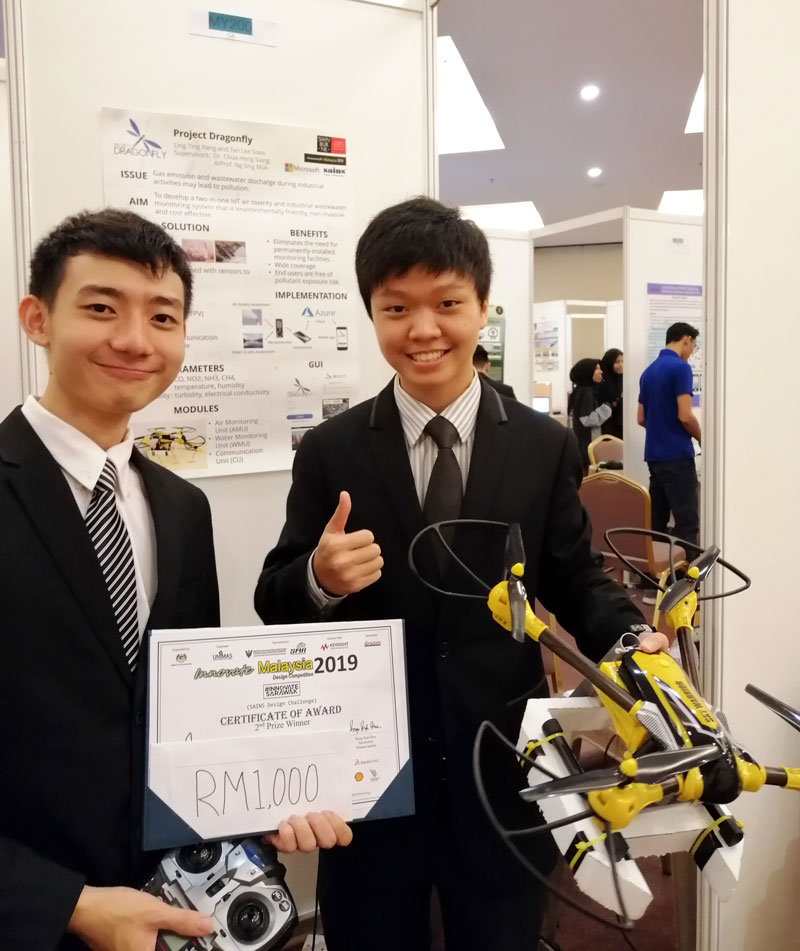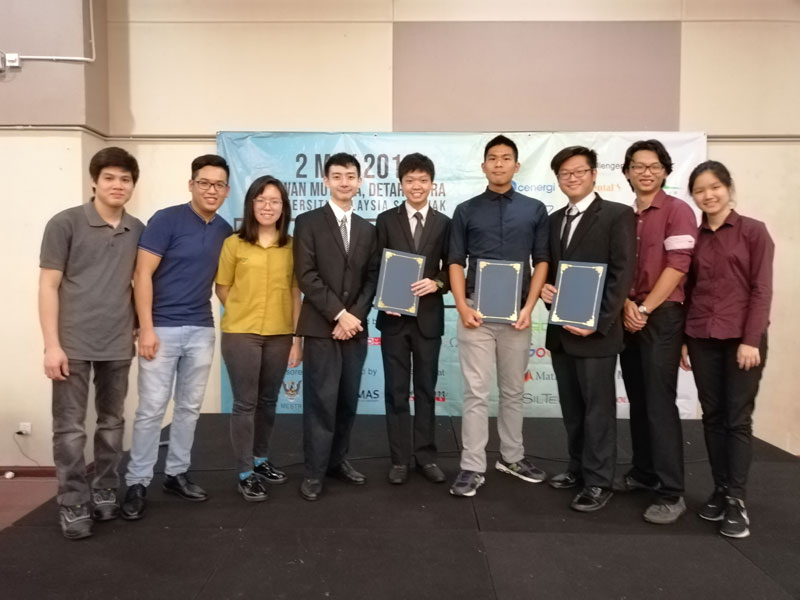KUCHING – The Innovate Sarawak Design Challenge 2019 was a success for three teams of engineering students from Swinburne.
Team MY200 consisting of Peter Ling Ting Rang and Marcus Tan Lee Soon emerged first runner-up under the Sarawak Information Systems Sdn. Bhd. (SAINS) Design Challenge category which carried the theme ‘Sarawak Digital Transformation’. The electrical and electronic engineering students’ project titled ‘Project Dragonfly’ is a two-in-one industrial wastewater and air toxicity monitoring solution that is environmentally friendly, non-invasive and cost effective.
Hoping to advance environmental monitoring works especially in Malaysia, Project Dragonfly’s system eliminates the need for permanently installed sensors by using a network of drones to effectively measure levels of air and water qualities in remote places. The features of the system include real-time data, user login and verification, first-person view (FPV), 4G cellular communication, and map integration. The system utilises Microsoft Azure services, Android mobile platform as well as Google Maps.
“The competition challenges us to think beyond conventional approaches. To stay ahead of the game, it was necessary for us to come up with out-of-the-box ideas,” Ling commented on the competition, which was recently held at UNIMAS.

Tan (left) and Ling with their Project Dragonfly prototype that claimed second prize.
The team was supervised by Swinburne’s Deputy Head of School of Engineering Dr Chua Hong Siang and former Associate Director for Swinburne Sarawak Research Centre for Sustainable Technologies Associate Professor Ng Sing Muk.
Also competing in the same category was electrical and electronic engineering student Bryan Wee Chung Wei who won third place with his project titled ‘Open Field White Root Disease Detection’. Under the supervision of lecturer Dr Then Yi Lung from the School of Engineering, Wee’s project employs in-ground sensors to predict the growth risk of a parasitic fungus plaguing commercial rubber trees.
The system works with a hygrometer sensor modelled to measure moisture and pH in the soil which will be fed into a microcontroller for computation. The computed data is passed into a cloud server for further data analysis using a predictive algorithm. The results are then forwarded back to the farmer for further onsite action.
Wee explained that not only does the system outperform the accuracy of detection rates of traditional visual inspection methods, but the technology is also affordable, portable, and scalable for Internet of Things (IoT), with potential applications in other plant disease diagnostics.
Meanwhile, first runner-up in the Malaysian Mosaics Sdn. Bhd. (MML) Design Challenge category were Kok Zhen Hui, Chua Hung Kern and Lee Yun En. Under the category that focuses on smart manufacturing technologies, the students from electrical and electronic, and robotics and mechatronics programmes demonstrated their smart tile inspection and sorting system.
Their Grade A tile system provides real-time quality control by integrating automated quality grading using machine vision technology and IoT-enabled sensors to ensure only grade A tiles are fed to the next station. Keeping up with Industrial Revolution 4.0 in the manufacturing line, the system also supports big data analysis using the SAS Viya analytics platform for improved productivity and predictive analysis using neural networks and deep learning.
The Innovate Sarawak Design Challenge is an extension of Innovate Malaysia Sarawak region organised jointly for the benefit of building Sarawak workforce to embrace the rapid development of the State. The Innovate Malaysia Design Challenge is the largest engineering design competition in the country which highlights the innovative projects of third-year or final-year undergraduate students in engineering, computer science, and science or mathematics. The event, which aims to tackle real-world problems with practical engineering solutions, drew 65 teams from public and private universities this year.
Swinburne’s Sarawak campus offers four-year honours degrees in engineering courses majoring in Electrical and Electronic, Robotics and Mechatronics, Civil, Chemical, and Mechanical. Double degrees in civil/business, mechanical/business or robotics and mechatronics/computer science are also available for students seeking to enhance their skills and knowledge across multiple disciplines, or increase their job prospects.
All engineering courses are recognised by professional engineering bodies such as Board of Engineers Malaysia (BEM), Engineers Australia and The Institution of Engineers Malaysia, ensuring it meets the highest standard of the profession and the industry.
For more information about Swinburne, visit its website www.swinburne.edu.my, Facebook page (@swinburnesarawak), Instagram (@swinburnesarawak), Twitter page (@Swinburne_Swk) or YouTube channel (Swinburne Sarawak).


